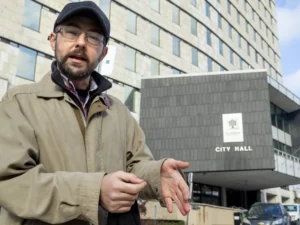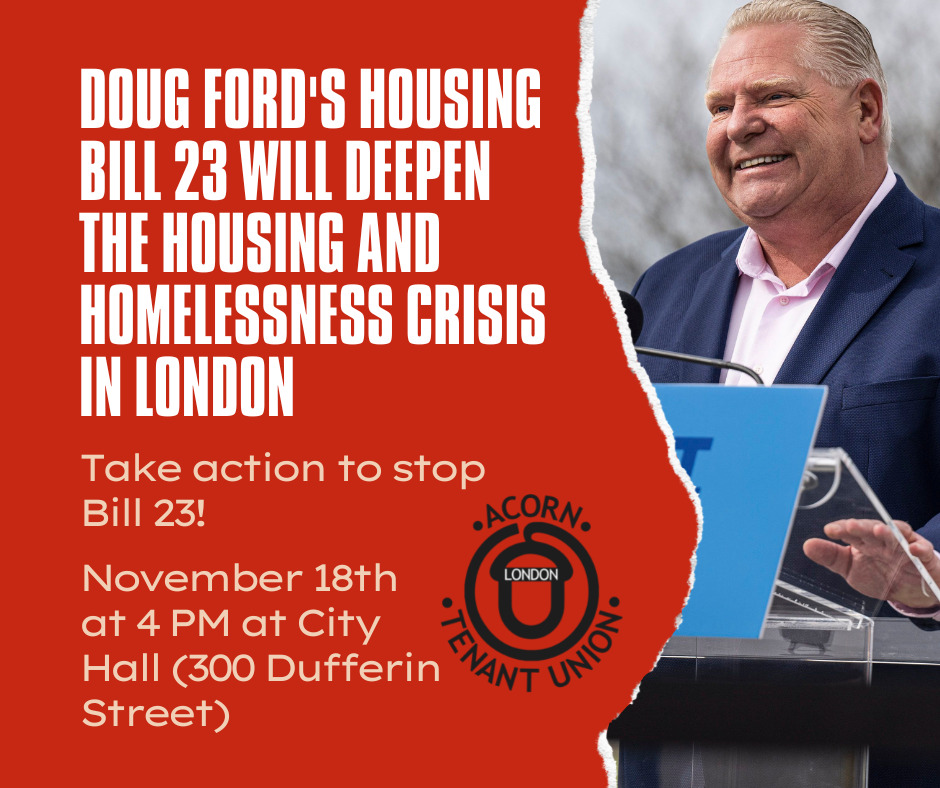‘Absolute disaster’: Tenants’ group fights proposed provincial housing law
Posted November 18, 2022
 The London chapter of a national tenants’ group is raising the alarm over the province’s proposed legislation to accelerate home construction in Ontario, saying the yet-to-be-passed bill will slow the creation and reduce the city’s affordable units stock.
The London chapter of a national tenants’ group is raising the alarm over the province’s proposed legislation to accelerate home construction in Ontario, saying the yet-to-be-passed bill will slow the creation and reduce the city’s affordable units stock.
The London chapter of a national tenants’ group is raising the alarm over the province’s proposed legislation to accelerate home construction in Ontario, saying the bill would slow the creation and reduce the city’s stock of affordable units.
Bill 23, also known as the More Homes Built Faster Act, is the main legislation put forward by the Ontario government as it aims to spur the construction of 1.5 million homes in the province during the next decade to address the existing housing crisis.
As part of the provincial housing strategy, the government is proposing to streamline the approval process for new developments – and even remove development charges for certain types of projects – while also allowing up to three residential units on properties now zoned for only one home.
But other proposed changes included in the bill, which recently passed second reading at the legislature, represent an attack on renters, said Jordan Smith, a leader of the London chapter of Association of Community Organizations for Reform Now (ACORN) Canada.
Key among the troublesome changes is the province’s proposal to cap the number of affordable units municipalities can request be built as part of new developments at five per cent, a practice known as inclusionary zoning, Smith said. In addition, the province is proposing setting a limit to how long these units can be rented out at below-market rents of 25 years.
“When you really begin to read through the details of this bill and can contrast it with the reality of this crisis that we’re actually facing, this bill isn’t just a bad idea, it’s an absolute disaster of an idea,” Smith said.
The province’s current rules, which allow inclusionary zoning only in “protected major transit station areas,” would make its use tricky in London, a consultant hired by city hall to analyze its financial viability, said earlier this year. Developers simply will build elsewhere, or not at all, according to that analysis.
City council voted to ask Queen’s Park for special permission to use inclusionary zoning – a policy that would require new residential buildings to set aside a certain percentage of affordable units – across London, instead of just in limited areas near transit hubs. Earlier this fall, city staff said those negotiations are still ongoing with the province. That means right now, there is no inclusionary zoning policy on the books in London at all.
Smith said simply building new homes will do little to address London’s affordability crisis because new units hitting the market will be beyond the reach of many.
Rents in London grew by about 33 per cent during the past year, the fastest pace in the country, according to a recent report by Rentals.ca, a website used by landlords to advertise their units.
According to the same report, the average asking rent for a vacant one-bedroom unit in the city was $1,810 in September, while two-bedroom apartments were going for $2,184.
“It’s not a question of the number of houses; it’s a question of the right houses . . . It’s a question of affordable homes . . . (people) need to have rent that they can live with and survive with,” Smith said.
“We are now at a point where it’s not just the poor and the disabled who are struggling. It’s the working class who are struggling. They’re struggling to pay their bills; they’re struggling to keep food on the table,” he said.
Another point of contention is the bill can make it harder for municipalities to pass rental replacement bylaws that force developers to offer tenants financial assistance and the right to return to a replacement unit when they decide to demolish and rebuild a rental property. Such bylaws only exist in Toronto and Mississauga.
To pressure the province to repeal the bill, ACORN is setting up demonstrations across the province Friday and has sent more than 1,000 letters to Premier Doug Ford and MPPs part of his government.
In London, members of the local chapter will meet in front of city hall at 4 p.m. Friday. The demonstration also will be attended by local NDP MPPs Terence Kernaghan and Peggy Sattler, as well as rookie London councillors David Ferreira and Skylar Franke.
“The price of rent is skyrocketing in London, while thousands of Londoners wait for public housing on the city’s wait list . . . People simply cannot afford to keep up with these prices,” Kernaghan said in an emailed statement.
“Bill 23 promises do nothing to solve the affordable housing crisis. Instead, it threatens to remove even more protections for renters . . . To create truly affordable housing in Ontario, we need stronger rent control.”
Despite some of the backlash Bill 23 has received, the government insists making it easier for developers to build new homes is the best way to address the province’s housing crunch.
“Urgent action is needed to address Ontario’s housing crisis as too many families are already struggling with housing and the rising cost of living,” a spokesperson for Ontario’s Municipal Affairs Minister Steve Clark said in an emailed statement.
“We are taking bold action to keep costs down and remove barriers to home construction. By enabling the development of new housing supply – including rental housing – we are helping to ensure that renters can find a home that meets their needs and budget.”
The government has a deadline of Friday at 1 p.m. to make amendments to the bill.
****

